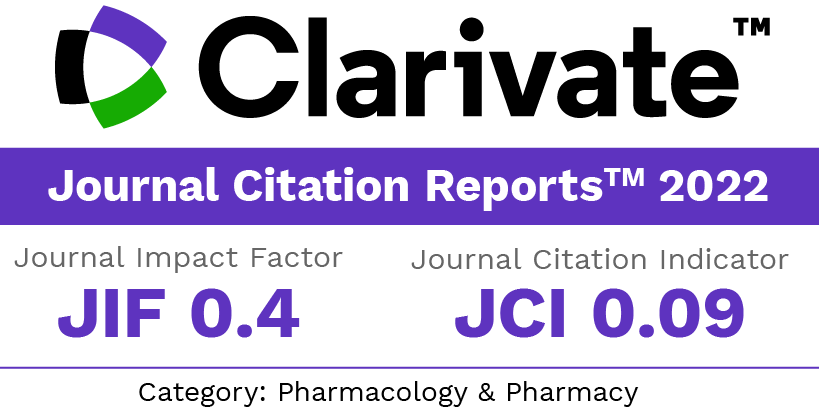Efecto del tensioactivo sobre la liberación de ciprofloxacina a partir de microesferas de gelatina
Palabras clave:
Las microesferas, tensioactivos, ciprofloxacina, glutaraldehídoResumen
Las microesferas de gelatina con alta eficacia de captura se prepararon mediante emulsificación (usando diferentestensioactivos) y reticulación por glutaraldehído con el fin de mejorar la estabilidad de las microesferas.Las microesferas se caracterizan por la eficacia de captura de la ciprofloxacina, la hinchazón, FT-IR,microscopía electrónica de barrido (SEM) y properties.From fuga de los resultados obtenidos, se concluye quelas microesferas de gelatina atrapadas con ciprofloxacino preparan usando tres diferentes tensioactivosaumento de la vida útil de microesferas de gelatina.Descargas
Citas
Ilum. L and Davis. S.S. The targeting of drugs parenterally by use of microspheres. J.Parenter Sci Technol 1982; 36: 242-251.
Majeti. N. V. Ravi kumar. Nano and Microparticles as Controlled Drug Delivery Devices. J. Pharm. Sci 2000; 3 (2): 234-258.
Choy YB, Cheng F, Choi H, and Kim K. K. Monodisperse gelatin microsphere as a drug delivery vehicle:release profile and effect of crosslinking density. Macromol. Biosci. 2008;8(8):758-65.
Gurny. R, Peppas. N.A., Horrington.D.D., and Banker. G.S. Development of biodegradable and injectable lactices for controlled release of potent drugs. Drug Dev.Ind.Pharm 1981; 7: 1-25.
Okada. H., Yamamoto. M., Heya. T., Inoue. Y., Kamei.S Ogawa. and Y.,Toguchi. H. Drug delivery using biodegradable microspheres. J. Contr. Release 1994;28: 121–129.
Zarana S.Patela, Masaya Yamamotob, Hiroki Uedab, Yasuhiko Tabatab and Antonios G. Mikosa Biodegradable gelatin microparticles as delivery systems for the controlled release of bone morphogenetic protein-2. Acta Biomaterialia 2008;4(5):
-1138.
Langer.R. Invited review polymeric delivery systems for controlled drug release. Chemical Engineering Communication 1980.
Langer.R. and Peppas.N.A. Present and future applications of biomaterials in controlled drug delivery systems. Biomaterials 1981; 2(4): 201-214.
Pitt.C.G. and Schindler.A. Review biodegradability of synthetic polymers used for medical and pharmaceutical. J.Bioact.Compat.Pol 1986; 1: 467-497.
Grandfils.C., Flandroy.P., Nihant.N.,Barbette.S., Jerome. R.,Teyssie. P. and Thibaut. A. Preparation of Poly (D, L) lactide microspheres by emulsion-solvent evaporation and their clinical applications as a embolic material. J. Biomed. Mater. Res 1992;26: 467–479.
Viswanathan. N. B., Thomas. P. A., Pandit. J. K., Kulkarni. M.G. and Mashelkar. R. A. Preparation of non-porous microspheres with high entrapment efficiency of proteins by a (water-in-oil)-in oil emulsion technique. J. Controlled Release 1999; 58: 9–20.
Youan. B. B. C., Benoit. M. A., Baras. B. and Gillard.J. Protein-loaded poly (epsiloncaprolactone) microparticles. I. Optimization of the preparation by (water-in-oil)-in water emulsion solvent evaporation. J. Microencapsulation 1999; 16(5): 587-599.
Akin. H. and Hasirci. N. Preparation and characterization of crosslinked gelatin microspheres. J. Appl. Polym. Sci. 1995; 58(1):95-100.
Dinarvand.R., Mahmoodi.S., Farboud.E., Salehi. M. and Atyabi. F. Preparation of gelatin microspheres containing lactic acid –Effect of crosslinking on drug release. Act Pharma 2005;55: 57-67.
Conway. B. R. and Alpar. H. O. Double emulsion microencapsulation of proteins as model antigens using polymers: effect of emulsifier on the microsphere characteristics and release kinetics. Eur. J. Pharm. And Biopharm. 1996;42: 42–48.
Cascone. M. G., Lazzeri. L., Carmignani. C. and Zhu. Z.Gelatin nanoparticles produced by a simple W/O emulsion as delivery system for methotrexate. J. Mater. Sci. 2002;13: 523-526.
Vandelli. M. A., Rivasi. P., Guerra. F., Forni and Arletti. R. Gelatin microspheres cross-linked with D, L-glyceraldehyde as a potential drug delivery system: Preparation, characterization, in vitro and invivo studies, Int. J. Pharm 2001; 215: 175–184.
Ozeki. M. and Tabata. Y., In vivo degradability of hydrogels prepared from different gelatins by various cross-linking methods. J.Biomater Sci Polymer Ed 2005;16: 549-561.
Faton. J. H., and Reeves. D. S.,Fluoroquinolone antibiotics microbiology, pharmacokinetics and clinical use. Drugs 1998; 36:193-228.
Deborah. M. Campoli., Richards., Jon. P. Monk., Allan Prince., Paul Benfield., Peter. A. Todd and Alan Ward. Ciprofloxacin- A review of its antibacterial activity, pharmacokinetic properties and therapeutic use. Drugs 1988;35:373-447.
Thakkar. H. and Murthy. R.S.R. Polyethylene glycol as a de-aggregating agent in the preparation of celecoxib loaded gelatin microspheres. Ars Pharm 2005; 46(1):19-34.
Elisabetta Eposito, Rita Coresti and Claudio Nastruzzi Gelatin microspheres: influence of preparation parameters and thermal treatment on chemico-physical and biopharmaceutical properties. Biomaterials 1996; 17(20):2009-2020.
Chatterji.P.R. Gelatin with hydrophilic/hydrophobic grafts glutaraldehyde crosslinks. J. Appl Polymer Sci 1989;37(8):2203-2212.
Narayani. R. and Panduranga Rao. K. Sustained release of proponalol hydrochloride from biodegradable gelatin microspheres. Trends Biomater Artif Organs 1990; 5(1):22-28.
Narayani.R. and Panduranga Rao. K. Preparation, Characterization and In-Vitro Stability of Hydrophilic Gelatin microspheres using a Gelatin-Methotrexate Conjugate. Int. J. Pharm. 1993;95(1-3):85-91.
Harland. R.S. and Peppas. N. A. Solute diffusion in swollen membrances VII. Diffusion in semi crystalline networks. Colloid.Polym.Sci 1989; 267:218.
Descargas
Publicado
Cómo citar
Número
Sección
Licencia
Los artículos que se publican en esta revista están sujetos a los siguientes términos en relación a los derechos patrimoniales o de explotación:
- Los autores/as conservarán sus derechos de autor y garantizarán a la revista el derecho de primera publicación de su obra, la cual se distribuirá con una licencia Creative Commons BY-NC-SA 4.0 que permite a terceros reutilizar la obra siempre que se indique su autor, se cite la fuente original y no se haga un uso comercial de la misma.
- Los autores/as podrán adoptar otros acuerdos de licencia no exclusiva de distribución de la versión de la obra publicada (p. ej.: depositarla en un archivo telemático institucional o publicarla en un volumen monográfico) siempre que se indique la fuente original de su publicación.
- Se permite y recomienda a los autores/as difundir su obra a través de Internet (p. ej.: en repositorios institucionales o en su página web) antes y durante el proceso de envío, lo cual puede producir intercambios interesantes y aumentar las citas de la obra publicada. (Véase El efecto del acceso abierto).



















